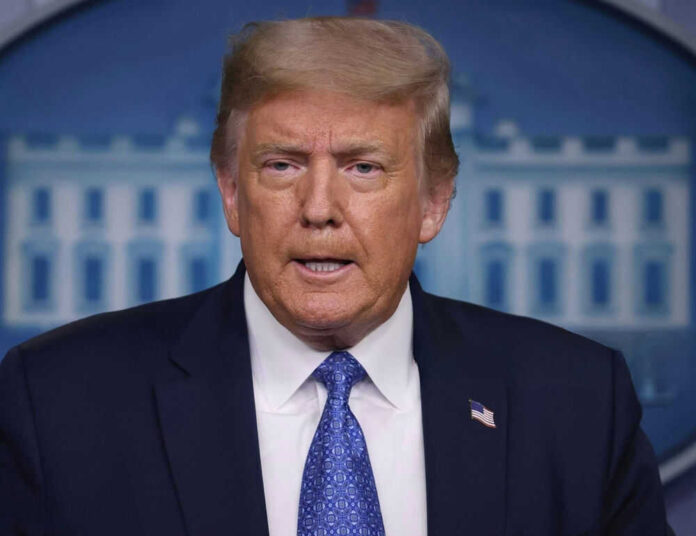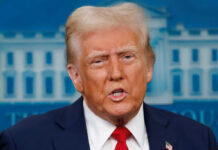
(NationalFreedomPress.com) – When the nation’s most polarizing political figure uses the official power of the Oval Office to launch personal attacks on two of Congress’s most combative progressive women, the boundaries of political discourse, and decency, are thrust into a new state of crisis.
Story Snapshot
- Trump called Rep. Jasmine Crockett “a very low IQ person” and joked Somalia should “take back” Rep. Ilhan Omar during an official White House event.
- Crockett and Omar responded swiftly, denouncing Trump’s remarks as racist and false, fueling a firestorm of partisan debate.
- The event highlights Trump’s ongoing strategy of targeting progressive women of color and the normalization of personal insults in official government settings.
- This incident builds on a long pattern of racial and political polarization in American politics, raising questions about the future of public discourse.
Trump’s Oval Office Barrage Redefines the Political Battlefield
September 25, 2025: The presidential seal gleamed on the Resolute Desk as Donald Trump, in the midst of a routine executive order signing, suddenly veered off script. Before the cameras, Trump unleashed a volley of invective at Rep. Jasmine Crockett, labeling her “a very low IQ person.” The spectacle escalated as he turned to Rep. Ilhan Omar, claiming he had asked Somalia’s president to “take her back”, and, with a punchline meant to wound, asserted that even the Somali leader refused the offer. These words weren’t tossed out at a campaign rally or whispered to loyalists; they exploded in the sanctity of the Oval Office, sending shockwaves beyond the White House walls.
Neither Crockett nor Omar stayed silent. Crockett, a rising Democratic star known for her fierce committee showdowns, fired back on social media, urging Americans not to “back down” in the face of bullying. Omar, no stranger to Trump’s barbs, called the former president a “lying buffoon” and categorically denied the Somali president ever discussed her citizenship with Trump. Their rapid responses ignited a furious media cycle, as pundits dissected not just the insults, but what it means for the country when the president’s rhetoric echoes through the halls of official power.
Decoding the Power Play: Rhetoric, Race, and Political Strategy
This isn’t Trump’s first foray into personal attacks against women of color in Congress. His 2019 “go back” tweets targeting The Squad, Omar included, set the template for a brand of political provocation that energizes his base and enrages opponents. By launching his latest offensive from the Oval Office, Trump blurred the already thinning line between campaign theatrics and statesmanship. Analysts argue this calculated move reinforces his nationalist credentials while painting progressive lawmakers as outsiders, despite their American citizenship and elected status. The anecdote involving Somalia’s president, swiftly debunked by Omar, further exemplifies Trump’s penchant for blending fact with performance.
Republican leadership has largely sidestepped direct condemnation, focusing instead on recent failed attempts to censure Omar over controversial remarks. The larger message is clear: personal attacks, even those laced with racial or xenophobic undertones, are now part of the GOP playbook for mobilizing loyal voters. For Americans watching, the implication is chilling, official government business can now double as partisan theater, with real consequences for the targets and the tone of national debate.
Ripple Effects: Community Fallout and the Erosion of Political Norms
The immediate impact rippled through media outlets, social feeds, and the communities directly referenced. Somali-Americans, already accustomed to being pawns in political games, condemned Trump’s comments as a dangerous escalation. Progressive groups rallied around Crockett and Omar, framing the incident as part of a sustained attack on women and lawmakers of color. Meanwhile, Trump supporters hailed the president’s “plain-spoken” style as an antidote to political correctness, deepening the nation’s fault lines.
Beyond the headlines, scholars warn of the long-term damage: the normalization of personal insults in official settings, the chilling effect on minority representation, and the specter of democratic backsliding when leaders use their bully pulpit to target individuals. The story’s resonance is amplified by the timing, mere days after the House failed to censure Omar, signaling how partisan warfare now overshadows congressional decorum. For voters and future candidates alike, the lesson is stark: to survive in today’s political arena, one must be ready for battle, insults and all.
The Bigger Picture: Why This Moment Matters for America
For all the spectacle, this episode is more than just another Trump headline. It is a litmus test for the health of American discourse and the resilience of its institutions. Crockett and Omar’s defiant responses do more than defend their reputations; they set a blueprint for how to confront bullies and misinformation in an era when truth is a contested commodity. The absence of formal consequences for Trump’s remarks signals how deeply personal attacks have been woven into the fabric of political life.
As the dust settles, the nation faces questions that go beyond the day’s soundbites. Can American politics return to a standard of mutual respect, or has the window closed on civility? Will leaders be held accountable for the words they wield from the highest offices, or will personal attacks become the currency of power? The answers, and the future of American democracy, hang in the balance each time a line is crossed, and the world is watching who, if anyone, will draw it back.
Copyright 2025, nationalfreedompress.com
























